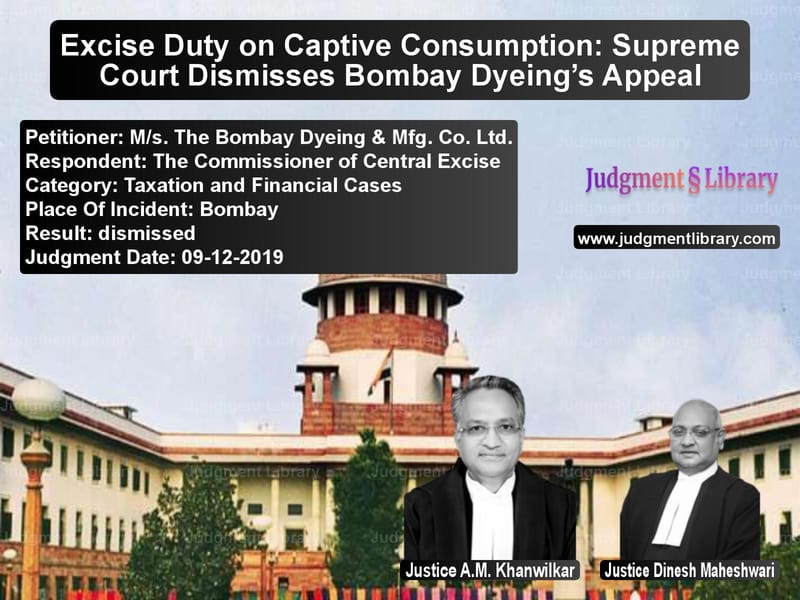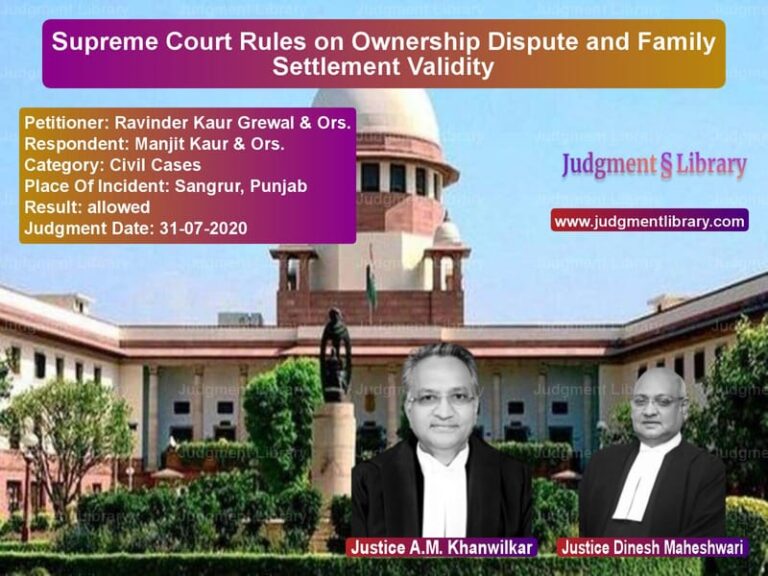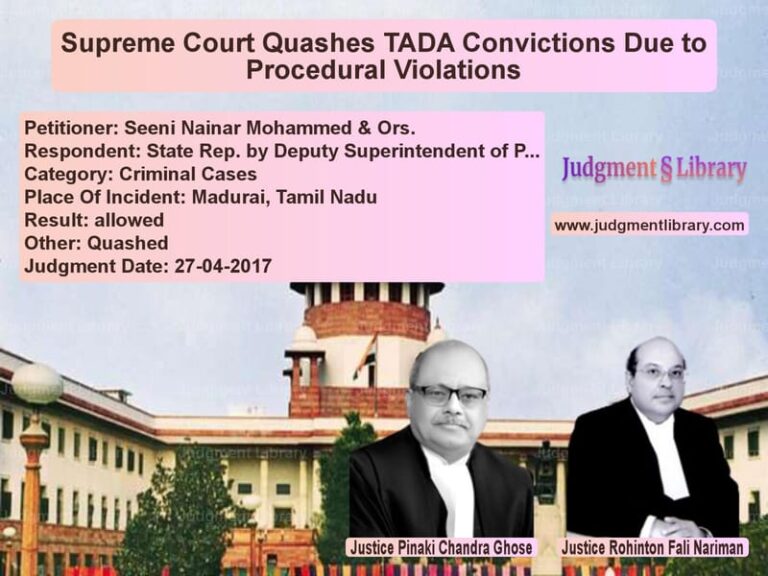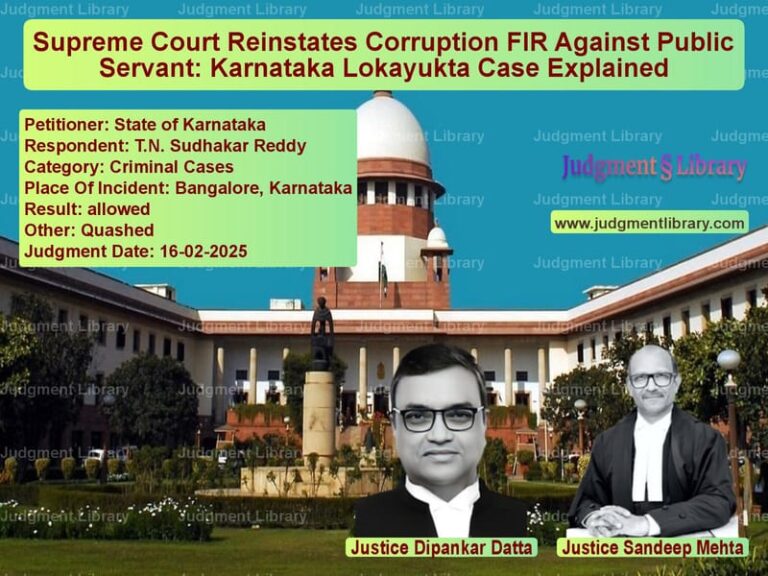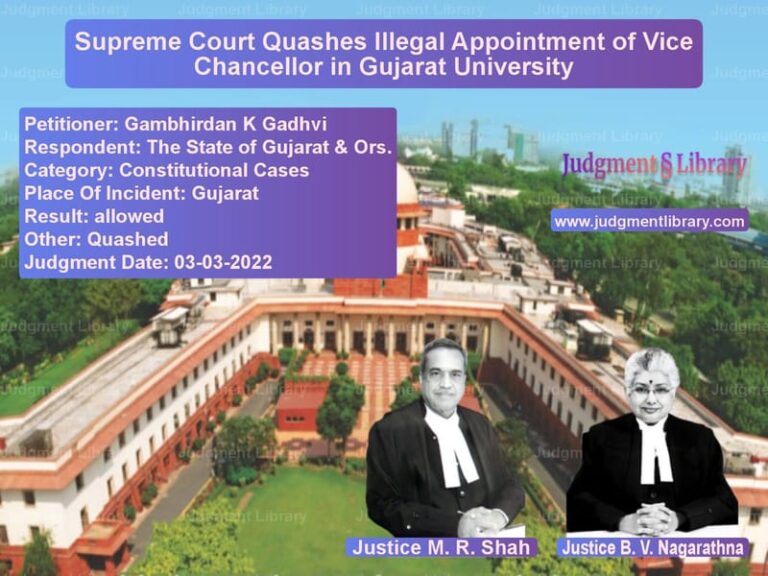Excise Duty on Captive Consumption: Supreme Court Dismisses Bombay Dyeing’s Appeal
The case of M/s. The Bombay Dyeing & Mfg. Co. Ltd. vs. The Commissioner of Central Excise revolved around a dispute concerning excise duty liability on yarn manufactured for captive consumption. The Supreme Court had to determine whether the excise duty was payable when the yarn was not removed from the manufacturing premises but was used for further production of fabric.
Background of the Case
M/s. The Bombay Dyeing & Manufacturing Co. Ltd. (the appellant) is engaged in the manufacture of cotton and man-made fabrics. The primary contention of the appellant was that the fabric manufactured within its composite mills was not subject to excise duty since it was not removed for sale or external consumption.
The company relied on the Delhi High Court judgment in J.K. Cotton Spinning & Weaving Mills Co. Ltd. & Ors. vs. Union of India & Ors., which held that excise duty was not payable unless the product was removed from the factory. Based on this, the appellant filed two writ petitions in the Delhi High Court, challenging the excise duty demand.
Legal Issues Before the Supreme Court
- Whether excise duty is payable on yarn manufactured for captive consumption under Rule 9 read with Rule 49 of the Central Excise Rules, 1944.
- Whether the assessments made by the Central Excise Department were provisional or final.
- Whether the demand for excise duty for the period 1981-1985 was barred by limitation.
- Whether a Show Cause Notice under Section 11A of the Central Excise Act, 1944, was required before enforcing the duty demand.
Arguments by the Appellant (Bombay Dyeing)
- The company argued that since the yarn was not removed from the factory but used internally, it was not liable for excise duty.
- They relied on the Delhi High Court’s decision in J.K. Cotton Spinning & Weaving Mills, which was later overruled by the Supreme Court.
- The appellant contended that the demand for duty was barred by limitation under Section 11A of the Excise Act.
- It argued that the excise authorities had not issued a formal provisional assessment order, and therefore, the demand for duty was unlawful.
Arguments by the Respondent (Central Excise Department)
- The department argued that excise duty is levied on the manufacture of goods and not on their sale or removal.
- They contended that the appellant had executed B-13 bonds under Rule 9B of the Excise Rules, acknowledging the provisional nature of assessments.
- Since the assessments were provisional, the issuance of a Show Cause Notice under Section 11A was not required.
- The department relied on the Bombay High Court’s decision in The Jam Shri Ranjitsinghji Spg. & Wvg. Mills Co. Ltd. vs. Union of India, which upheld similar excise duty demands.
Supreme Court’s Judgment
The Supreme Court dismissed the appeal and ruled in favor of the Central Excise Department. The Court held that:
- Excise duty is payable on the manufacture of goods, irrespective of whether they are removed from the premises.
- The appellant had voluntarily executed B-13 bonds, acknowledging the provisional assessment of duty.
- Since the assessments were provisional, a Show Cause Notice under Section 11A was not required.
- The demand for excise duty was not barred by limitation as the appellant had agreed to provisional assessments.
The Court observed:
“The appellant cannot be allowed to approbate and reprobate – for inviting the High Court of Delhi to pass an interim order stipulating that it would execute bonds in Form B-13 referable to Rule 9B of the Rules and continue to file monthly RT-12 returns from time to time, on which endorsements have been made indicating that it is a case of provisional assessment.”
Additionally, the Court held:
“Excise duty liability arises at the stage of manufacture and not at the stage of sale or removal. The appellant, having voluntarily entered into provisional assessments, cannot later argue against its binding nature.”
Final Decision
- The Supreme Court dismissed the appeal.
- The excise duty demand for the period 1981-1985 was upheld.
- The appellant was directed to pay the duty as assessed by the Central Excise Department.
Key Takeaways from the Judgment
- Excise duty liability arises at the stage of manufacture, regardless of whether the goods are removed from the premises.
- Provisional assessments made under Rule 9B are binding, and a Show Cause Notice under Section 11A is not required.
- A taxpayer cannot later challenge the validity of provisional assessments after voluntarily executing bonds and accepting the assessment procedure.
- This ruling reinforces the principle that excise duty is a duty on manufacture and not on the sale or removal of goods.
This judgment has significant implications for manufacturers operating composite mills and clarifies the applicability of excise duty on goods used for captive consumption.
Petitioner Name: M/s. The Bombay Dyeing & Mfg. Co. Ltd..Respondent Name: The Commissioner of Central Excise.Judgment By: Justice A.M. Khanwilkar, Justice Dinesh Maheshwari.Place Of Incident: Bombay.Judgment Date: 09-12-2019.
Don’t miss out on the full details! Download the complete judgment in PDF format below and gain valuable insights instantly!
Download Judgment: Ms. The Bombay Dyei vs The Commissioner of Supreme Court of India Judgment Dated 09-12-2019.pdf
Direct Downlaod Judgment: Direct downlaod this Judgment
See all petitions in Income Tax Disputes
See all petitions in Tax Refund Disputes
See all petitions in Customs and Excise
See all petitions in Banking Regulations
See all petitions in Judgment by A M Khanwilkar
See all petitions in Judgment by Dinesh Maheshwari
See all petitions in dismissed
See all petitions in supreme court of India judgments December 2019
See all petitions in 2019 judgments
See all posts in Taxation and Financial Cases Category
See all allowed petitions in Taxation and Financial Cases Category
See all Dismissed petitions in Taxation and Financial Cases Category
See all partially allowed petitions in Taxation and Financial Cases Category

